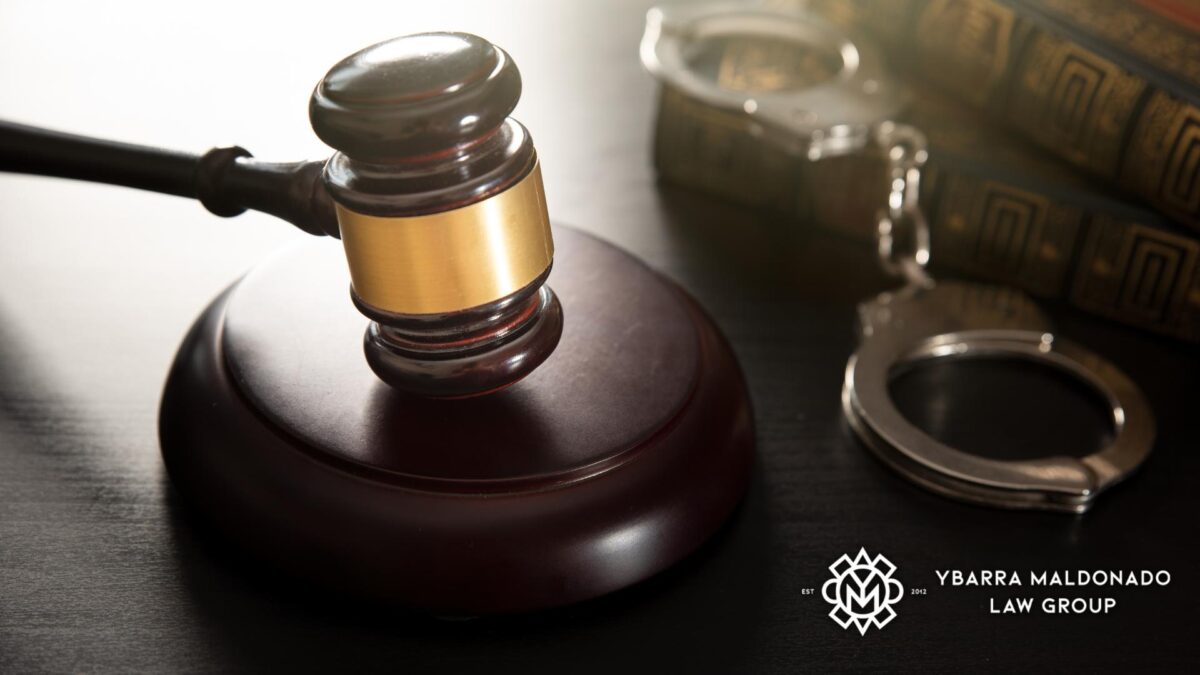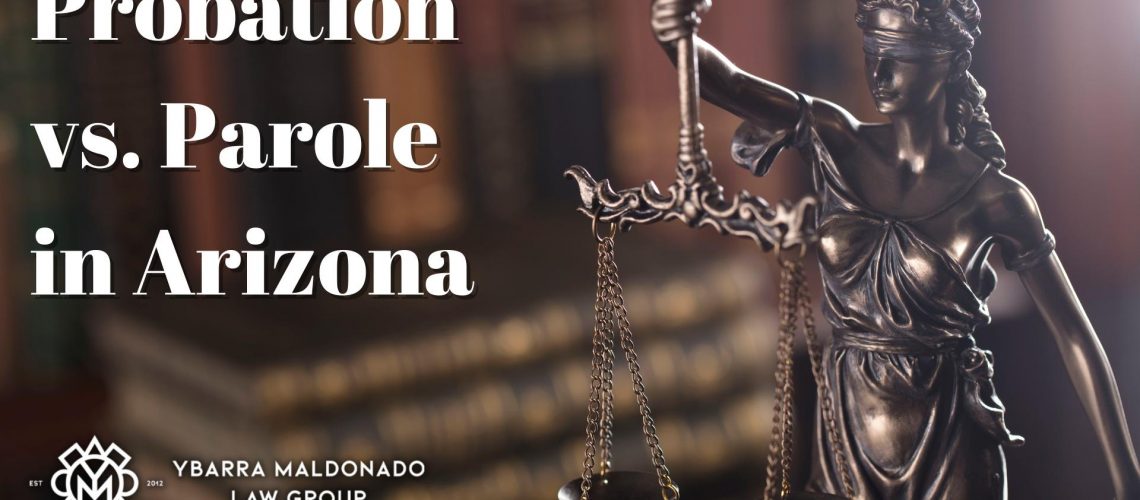In the criminal justice system, probation and parole are often used interchangeably, but the two terms mean completely different things. When facing criminal charges, it’s important to understand the difference between probation vs parole and how your attorney can help.
The Arizona criminal defense attorneys at the Ybarra Maldonado Law Group will explain the differences between parole and probation, their requirements and restrictions. It’s never too late for a criminal defense attorney to help. Our legal team can help, whether you’re eligible for probation or parole, so you can move on with your life and leave the past where it belongs.
To schedule a case evaluation with a criminal defense attorney from the Ybarra Maldonado Law Group, call (602) 910-4040 today.
What Is Probation?
Probation is offered to a person who has pleaded guilty in exchange for jail time. Instead of the offender serving their sentence in jail, they’re allowed to remain in the community under supervision by a probation officer. Not all crimes are eligible for probation, however, so some offenders may not be offered a probationary period in exchange for jail time.
Working with an experienced Arizona criminal defense attorney is crucial to getting a probation sentence in exchange for jail time. The attorneys at the Ybarra Maldonado Law Group understand what it takes to defend their clients against criminal charges and avoid a prison sentence.
How Does Probation Work in Arizona?
Arizona has three types of probation: supervised, unsupervised, or intensive. Depending on the type of criminal offense, a misdemeanor or felony can determine what kind of probation sentence an offender in Arizona will receive.
- Unsupervised probation is very rare and means the offender must follow the guidelines of their release but doesn’t have to check in with a probation officer. A person convicted of a minor offense, like a low-level misdemeanor or petty crime, may receive unsupervised probation.
- Supervised probation is most common, and offenders are given rules they must follow in exchange for probation. They must regularly meet with their probation officer and are usually required to pay fines and meet certain requirements.
- Intensive probation is the harshest form of probation and includes paying restitution to the victims of their crime. Individuals under intensive probation are only allowed to go to work or school.
What Are the Requirements for Probation?
When a person is offered probation, they must meet certain requirements and are restricted from using drugs, alcohol, and possessing weapons. A person’s probation conditions can vary based on the circumstances of their criminal offenses, but the requirements generally include the following.
- Fines
- Counseling
- Travel restrictions, unless work-related
- Community service
- Curfews
- Random drug tests
- Restitution
- Check-ins with their probation officer
- Random searches of car, home, phone, and computer
- Permission to take non-prescription medication
- No contact with any friends or family that have criminal records
- Approval when attending any social activities
- Monitored finances
- Internet and computer restrictions
Violating any of the above requirements can result in serious consequences. Depending on the severity of probation violations, the offender can either receive a warning or attend a probation violation hearing. A judge will determine the consequences of the probation violation and consider the severity of the original offense, the seriousness of the violation, and if the offender has violated probation in the past. A violation of probation can result in revoking probation and replacing it with a prison sentence. When serving probation, the offender must take the requirements seriously to avoid serving jail time.
What Is Parole?
Parole is offered to a person as a conditional release from prison, allowing them to serve the remainder of their sentence under supervision. The parole board is crucial when determining whether an offender qualifies for parole, and it takes more than just good behavior to justify a parole release. In addition to monitoring the offender’s behavior in prison, the parole board will also evaluate their rehabilitation efforts and other important factors before granting parole.
If a convict is granted parole, they’re assigned a parole officer that they must check in with frequently and are given a strict set of rules and restrictions they must adhere to to remain within their parole terms.
How Does Parole Work in Arizona?
In Arizona, parole is offered as an alternative to serving a full prison sentence. Typically, the offender has served the minimum jail time for their offense and will meet with the parole board to determine eligibility.
If the offender is granted parole, they must follow certain requirements or risk violating parole. A parole violation can put the offender back in prison, where they will serve the remainder of their sentence. However, if parole is completed, the sentence will be discharged.
Arizona’s Parole Board
When inmates become eligible for parole, they will have a hearing with the Arizona Board of Executive Clemency. During their hearing, the Board will weigh the possibility of the offender repeating their offense and if the parole is in the public’s best interest.
When determining an inmate’s eligibility, they will consider the following factors before they grant parole:
- Their criminal history
- The crime that led to their imprisonment
- The amount of time they have served
- Statements provided by the victim
- Their conduct in prison
- Mental illnesses
- Rehabilitation efforts
What Are the Requirements for Parole?
Offenders released on parole must follow strict rules and guidelines like those on probation. The offender’s parole restrictions will be determined by other factors, including the crime they committed. Common parole requirements, however, are:
- Frequent check-ins with their parole officer
- Restitution payments to the victim
- Avoid committing any crimes during parole
- Pass drug tests
- Community service
- Complete court-ordered counseling, alcohol or drug program, or other courses
- Avoid any friends or family with criminal records
- Follow any restraining orders
- Pay a supervision fee of a minimum of $65 per month
What Is the Main Difference Between Probation and Parole?

Parole and probation are easily confused since they involve being released from prison, the same terms of release, and severe penalties for violations. However, there is one major procedural difference between parole and probation.
Probation is granted during the offender’s initial sentence, whereas parole comes later. Probation is often given in exchange for prison time, but parole allows the offender early release in exchange for serving their entire sentence behind bars. An individual rarely serves any jail time before being released on probation, but an offender usually serves most of their sentence before they’re granted parole.
Are the Conditions for Probation and Parole Different?
The conditions of an offender’s parole or probation can vary based on their specific circumstances and crimes. While parole and probation often have similar restrictions and requirements, the sentencing judge or parole board may order additional conditions unique to the offender’s crimes. For example, an offender may be requested to complete additional drug and alcohol courses if their crime involved drug or alcohol use.
What Is the Difference Between a Parole and Probation Officer?
Probation and parole officers have similar job responsibilities, but the biggest differences between the two occupations are the offenders they supervise and the crimes involved. Since offenders who receive probation often serve it instead of a jail sentence, probation officers help individuals with their rehabilitation and reintegration efforts. Probation officers can help individuals by offering support however needed, ensuring compliance with court orders, and administering drug tests.
Parole officers are tasked with monitoring offenders convicted of harsher crimes. A parole officer usually focuses more on enforcing the parole rules and ensuring the offender isn’t committing any new crimes.
What Does a Probation or Parole Officer Do?
The duties of probation and parole officers are similar but vary because of the individuals they’re responsible for monitoring. Probation officers will schedule weekly meetings with the offender and help them sign up for any drug or substance abuse counseling course. They will monitor an offender’s activities to ensure compliance with their probation and help them become a contributing member of society.
Parole officers work with convicted felons, so their responsibilities are slightly harsher. A parole officer helps an offender find a job following their release. They’ll monitor their behavior and activities and report any violations to the court. They also help offenders reintegrate into society and help them avoid activities that can lead to repeat criminal offenses and parole violations.
Are You Facing Probation, Parole, or a Prison Sentence in Arizona?
It’s never a good idea to represent yourself when facing jail time, regardless of the severity of your criminal charges. Whether you’re facing probation, parole, or a jail sentence, an experienced Arizona criminal defense attorney can help. Offenders have a much better chance of receiving probation or parole when they hire a criminal defense attorney.
The attorneys at the Ybarra Maldonado Law Group understand that everyone makes mistakes and deserves a second chance. That’s why our criminal defense attorneys work so hard when representing offenders eligible for probation or parole.
The circumstances surrounding a crime can be that an offender was young and under the influence of others when they committed the crime, or they’ve been rehabilitated through the criminal justice system. Regardless, all offenders should be allowed to redeem themselves and become contributing members of society.
Contact a Phoenix Criminal Defense Lawyer with Ybarra Maldonado Law Group Today
If you’re facing criminal charges or are eligible for probation or parole, the Arizona criminal defense attorneys at the Ybarra Maldonado Law Group can help. To schedule a case evaluation with one of our attorneys, call (602) 910-4040 today.


